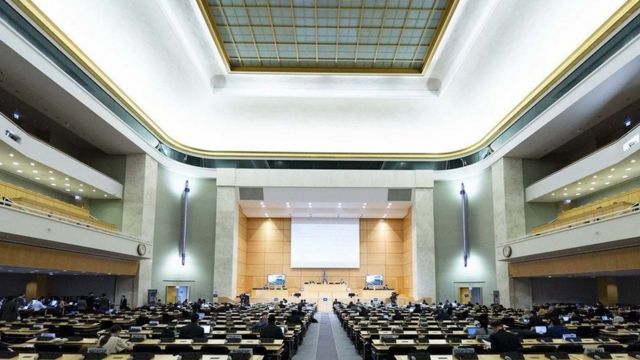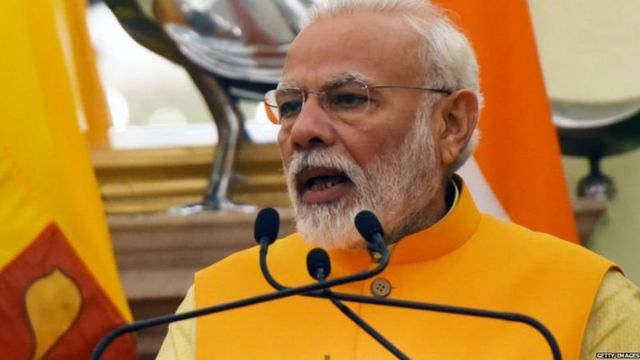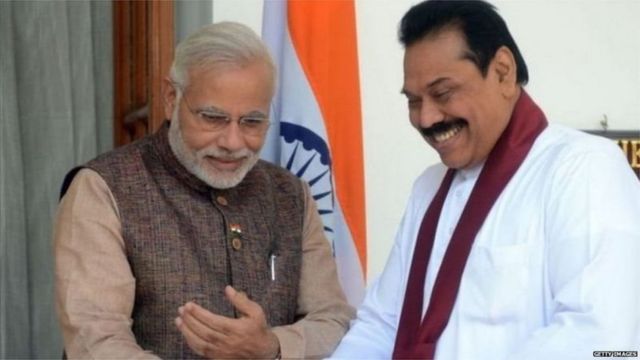resolution was introduced by the United Kingdom on behalf of several countries.
The resolution was called "Promoting Reconciliation, Accountability and Human Rights
in Sri Lanka" and expressed grave concern over ongoing human rights violations in Sri Lanka. China and Pakistan opposed the resolution, but India decided not to vote.
However, all speculations are now being made as to why India did so.
In fact, the issue of the Tamil community in Sri Lanka is one of the most important issues in the politics of the Indian state of Tamil Nadu. Tamil Nadu is scheduled to hold state assembly elections in April this year. The BJP is also participating in these elections. The opposition is trying to link India's UN vote to the election.
On the other hand, foreign affairs experts are calling non-voting a policy of India's 'first region'. In his view, foreign affairs have taken precedence over domestic politics and the Modi government has changed the policy of the UPA era.
End of Twitter post, 1
Why was this resolution introduced?
Satyamurthy of the Observer Research Foundation is an expert on India-Sri Lanka relations as well as Tamil Nadu politics.
Speaking to the BBC, he said: "This is not the first time that India has not voted on a resolution against Sri Lanka. A similar resolution was passed in 2014 and even then India did not vote. The resolutions passed in 2015 and 2019 included the will of the Sri Lankan government and the consent of other countries. That is why they were not voted on.
When Raja Paksha's government came to power in Sri Lanka in 2015, he assured the United Nations that he would conduct an independent and fair government-level investigation into human rights violations during the country's civil war. But this has not happened for many years.
That is why this resolution has been brought again.
Has India ever supported such a resolution in the past?
Satyamurthy says India voted in favor of a similar resolution in 2012. The resolution called for an independent inquiry into the human rights violations committed by government forces against the Tamil Tigers during Sri Lanka's civil war.
At the governmental level, people believe that there is a fundamental difference between the 2012 and 2021 resolutions. The 2012 resolution called for an international investigative team, including judges and lawyers. This time, the UN Human Rights Council has been asked to investigate, meaning that the UN Council has been tasked with policing.
Satyamurthy believes that this could be an important factor that led India to abstain from voting. India does not agree with this method of investigation and considers such an action against any one country.
So has India changed the policy of the UPA era?
"India's 2012 decision was based on domestic politics," says Andrani Bagchi, a senior foreign affairs journalist and diplomatic editor at the Times of India. This was not a foreign decision. At that time, the Congress was in power in Tamil Nadu with the DMK party in the UPA alliance and the DMK had pressured the Congress to vote against Sri Lanka.
He says that when the resolution came in 2014, the UPA was also in power in the federation. The proposal came before the NDA formed a federal government.
Andrani Bagchi says that in two years, the UPA had realized that voting against Sri Lanka would only harm India and not benefit it. And then in 2021, the federal government has repeated the UPA's 2014 decision.
What is the reason behind India's decision ?
Andrani Bagchi says there are a number of important reasons behind the federal government's decision. The first is that the Indian government has given the message that it will not allow domestic politics to dominate India's foreign policy.
Second, India's foreign policy has a tradition of prioritizing the region's neighbors. India has a number of interests in Sri Lanka. There are historical, political and cultural ties between the two countries. Voting against Sri Lanka will not benefit India's interests and these ties. India would never want Sri Lanka to go completely to the Chinese camp as it could endanger India's security.
By not voting, India has also ensured that whenever Sri Lanka decides to maintain its sovereignty, it will look after India's interests.
The third reason is that the Indian government thinks that the problem of the Tamil community living in Sri Lanka is their internal problem. India can advise Sri Lanka to uphold the supremacy of the Constitution. India believes that such issues cannot be resolved through international pressure.
That is why India said in its pre-vote statement that "India cares about two things when it comes to human rights in Sri Lanka. First, the Tamil community has our support and we demand equality, dignity, peace and justice for them. And secondly, Sri Lanka's unity, stability and regional harmony. We believe that these two issues go hand in hand and only by taking care of them can Sri Lanka's development be ensured.
"We will urge the Sri Lankan government to move towards reconciliation and meet the expectations of the Tamil community and work with the international community to ensure the freedom and human rights of the people," the Indian government said. Are safe
It may be recalled that the 13th Amendment to the Constitution of Sri Lanka mentions giving equal rights to the Tamil community.
The fourth reason is the foreign policy of the Indian government. At the international level, if a resolution on a particular country is hashed out, India does not participate in the voting. This happened only in 2012 when India participated in the voting.
Satya Murthy also emphasizes the same reason. Andrani, however, believes that the decision of the present federal government has nothing to do with the state elections in Tamil Nadu.
Politics of Tamil Nadu
Many experts are linking India's position to the Tamil Nadu elections. The DMK leaders themselves are saying that the federal government has taken this decision because of the Assembly elections.
The BJP is contesting the elections in the state along with the AIADMK and many experts believe that this will hurt the BJP in the state.
Three days before the vote on Saturday, Congress leader P Chidambaram had said that India should vote in favor of the resolution.
DMK, on the other hand, Stalin had also appealed for a vote and despite India not voting in the resolution, there has been a strong reaction from the DMK.
But Satya Murthy believes it will not do much harm to the BJP. "The issue of Sri Lanka's Tamil community is not important in the Tamil Nadu elections," he said.
In 2009, when the civil war was raging in Sri Lanka, the DMK and the Congress still won several seats. The Congress was in the federation at the time and the coalition that raised the issue of the Tamil community in Sri Lanka had lost the election.
Senior journalist TR Ram Chandran said, "The DMK may benefit from this decision of the government and the DMK itself is raising the issue vigorously."
Currently, there is no official response from the AIADMK, the ruling party in Tamil Nadu.






0 Comments